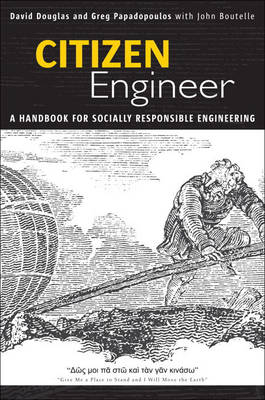
Citizen Engineer
Prentice Hall (Verlag)
978-0-13-714392-4 (ISBN)
- Titel ist leider vergriffen;
keine Neuauflage - Artikel merken
“Engineers create many of the inventions that shape our society, and as such they play a vital role in determining how we live. This new book does an outstanding job of filling in the knowledge and perspective that engineers must have to be good citizens in areas ranging from the environment, to intellectual property, to ensuring the health of the innovation ecosystem that has done so much for modern society. This is exactly the sort of book that engineers and those who work with them should read and discuss over pizza, coffee, or some other suitable, discussion-provoking consumable.”
—John L. Hennessy, president, Stanford University
“Citizen Engineer is the bible for the new era of socially responsible engineering. It’s an era where, as the authors show, engineers don’t just need to know more, they need to be more. The work is an inspiration, an exhortation, and a practical how-to guide. All engineers concerned with the impact of their work—and that should be all engineers—must read this book.”
—Hal Abelson, professor of computer science and engineering, MIT
“Code is law. Finally, a map to responsible law making. This accessible and brilliant book should be required of every citizen, and especially, the new citizen lawmakers we call engineers.”
—Lawrence Lessig, director, Safra Center for Ethics, Harvard University, and cofounder, Creative Commons
Being an engineer today means being far more than an engineer. You need to consider not only the design requirements of your projects but the full impact of your work—from an ecological perspective, an intellectual property perspective, a business perspective, and a sociological perspective. And you must coordinate your efforts with many other engineers, sometimes hundreds of them. In short, we’ve entered an age that demands socially responsible engineering on a whole new scale: The era of the Citizen Engineer.
This engaging and thought-provoking book, written by computer industry luminaries David Douglas and Greg Papadopoulos, focuses on two topics that are becoming vitally important in the day-to-day work of engineers: eco engineering and intellectual property (IP). Citizen Engineer also examines how and why the world of engineering has changed, and provides practical advice to help engineers of all types master the new era and start thinking like Citizen Engineers.
David Douglas is senior vice president of cloud computing and chief sustainability officer at Sun Microsystems. He oversees the strategy and execution of environmental initiatives across the company, including enhancements to Sun’s products in the areas of energy efficiency, cooling technologies, product recycling, and clean manufacturing. In addition, Dave is responsible for Sun's cloud computing business, with a focus on creating reliable, scalable, and sustainable computing and storage. He has been in the high-tech industry for more than two decades, including more than a decade of experience leading organizations to build more innovative, efficient, and eco-responsible products, and he has a long-standing passion about environmental issues. He earned bachelor’s and master’s degrees in electrical engineering and computer science from MIT. Dave sits on the board of the National Ecological Observatory Network (NEON) and is a senior fellow at the Breakthrough Institute. He currently lives in Concord, Massachusetts, with his family. Dave’s blog can be found at http://blogs.sun.com/enviro. With more than 20 years experience in the technology industry, Greg Papadopoulos has held several executive positions, most recently serving as Chief Technology Office and Executive Vice President — Research and Development at Sun Microsystems, Inc., responsible for managing Sun's technology decisions, global engineering architecture and advanced development programs. Prior to Sun, Papadopoulos was Senior Architect at Thinking Machines and has also founded a number of his own companies. Papadopoulos was an associate professor of electrical engineering and computer science at MIT, where he conducted research in scalable systems, multi threaded/data flow processor architecture, functional and declarative languages, and fault-tolerant computing. He holds a bachelor's degree in systems science from the University of California at San Diego, as well as master's and doctoral degrees in electrical engineering and computer science from MIT. Papadopoulos resides in Los Gatos, California with his wife Laurie and has passions for cooking, wine and eco-responsible living. John Boutelle has been a freelance writer for more than twenty years. During that time, John has worked with and interviewed hundreds of engineers and executives from a diverse range of enterprises worldwide, including Adobe, Apple, Cisco, General Electric, Hitachi, Lam Research, Nokia, Novell, Oracle, Pacific Bell, Seiko, Sony, Sun Microsystems, VeriSign, and dozens of start-ups. Previously he was editor-in-chief of the Orange County Business Journal in Santa Ana, California. He holds a master’s degree in business administration from the University of Michigan and a bachelor of arts degree from Pomona College. John resides with his family in Madison, Wisconsin.
Preface xv
Acknowledgments xix
About the Authors xxi
Introduction: While You Were Busy Debugging… xxiii
Part I: Advent of the Citizen Engineer 1
Chapter 1: “Citizen Engineer” Defined 5
Responsibilities of the Citizen Engineer 7
Knowledge Base of the Citizen Engineer 8
Chapter 2: How Engineering Got Its Paradigm Shifted 13
Changes in the Nature of Engineering 13
Engineering on a Whole New Scale 13
Externally Driven Changes in Engineering 19
Perspectives on an Engineering Transformation 24
Part I Summary, and What’s Next 25
Part II: Environmental Responsibility 27
Chapter 3: Environmental Impact: The Big Picture 31
Eco-Responsible Engineering: An Enormous
Opportunity 32
Core Challenges of Eco-Engineering 34
Chapter 4: Beyond the Black Cloud: Looking at Lifecycles 37
The “Cradle to Cradle” Vision 40
Chapter 5: A Pragmatic Approach to Lifecycle Analysis 45
A Basic Lifecycle Model 45
Additional Lifecycle Considerations 46
Embodied Energy and Embodied Carbon 52
Starting a Top-Level Assessment 56
Chapter 6: Setting Priorities, Requirements, and Goals 61
Knowing the Law 62
Business Requirements and Opportunities 64
Areas of Greatest Impact 65
Quick Wins and Low-Hanging Fruit 66
Chapter 7: Energy and Emissions 69
Common Sources of Energy 70
Calculating Energy and Power 73
Energy Impacts: Finding the Cleanest Source of Power 75
Energy and GHG Emissions 76
Putting a Value on Carbon (Dioxide!) 80
Heat, Noise, Light, and Radio Emissions 81
Process-Related GHG Emissions 82
Energy Efficiency in Product Design 83
An Example: Energy Efficiency in Data Centers 86
Chapter 8: Chemicals, Materials, and Waste 93
Chemistry and the Law 93
Packaging and Documentation 96
Waste and Renewal 98
Chapter 9: Water and Other Natural Resources 105
Social Considerations 105
Business Considerations 106
Calculating the Water Footprint 106
Trading Virtual Water 107
Other Natural Resources 108
Chapter 10: An Example of Eco-Engineering: Interface, Inc. 111
An Aggressive Initiative with Very Specific Goals 111
Chapter 11 Eco-Engineering: The Grass Is Always Greener 117
Carbon Neutrality: Good Start but Not Enough 117
Greenwashing and Green Noise 120
Measuring and Sharing with OpenEco 123
Part II Summary, and What’s Next 125
Part III: Intellectual Responsibility 127
Chapter 12 Intellectual Property Law Fundamentals 131
IP 101: Core Concepts 131
Patents 134
Copyright 141
Trademarks 147
Trade Secrets 148
Nondisclosure Agreements 150
Employment Contracts and IP Ownership 151
Tip Sheet: Inbound and Outbound IP 157
How to Protect Your IP in Emerging Markets 159
Back to Patent Protection: The Good, the Bad, and the Ugly 161
Chapter 13: Open Source Software: Licenses and Leverage 165
“Free” Software Licenses 166
Nonfree but Free-Sounding Software Licenses 169
A Closer Look at the GPL 169
Contributor Agreements 171
Software Indemnity 175
Chapter 14: Creativity and Control 179
Maximizing the Cycle of Innovation 179
How We Got Here 181
Control over Interfaces 184
Innovation Commons 186
The Economics of Open Source 187
Beyond Software 189
Building an Open Source Community: Practical
Advice from a Pro 194
Chapter 15: Protecting Digital Rights 199
Digital Rights Management 199
Is “Open DRM” an Oxymoron? 201
Fair Use and Other Concepts for Reducing
Restrictions 202
Part III Summary, and What’s Next 204
Part IV: Bringing It to Life 205
Chapter 16: Education of the Citizen Engineer 207
Updating Engineering Curricula 208
Advice for Engineering Students 211
Advice for Engineering New Hires 212
Chapter 17: Citizen Engineers in Action 215
Appendix 219
Lifecycle Phase Checklists 219
Required Reading for Citizen Engineers 223
Notes 225
Photo Credits 233
Index 235
| Erscheint lt. Verlag | 10.9.2009 |
|---|---|
| Verlagsort | Upper Saddle River |
| Sprache | englisch |
| Maße | 155 x 227 mm |
| Gewicht | 360 g |
| Themenwelt | Sozialwissenschaften ► Soziologie ► Spezielle Soziologien |
| Technik ► Bauwesen | |
| Technik ► Umwelttechnik / Biotechnologie | |
| ISBN-10 | 0-13-714392-3 / 0137143923 |
| ISBN-13 | 978-0-13-714392-4 / 9780137143924 |
| Zustand | Neuware |
| Haben Sie eine Frage zum Produkt? |
aus dem Bereich


